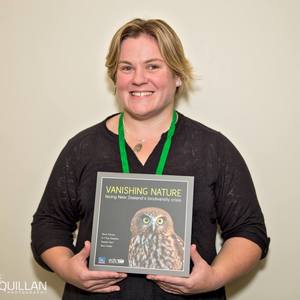This is a guest post on behalf of Marie Brown, Senior Policy Analyst for Environmental Defense Society (EDS), specializing in biodiversity policy. The text by Veronika Meduna (from Radio New Zealand National) was based on a radio interview with Marie Brown (see below for the link to the podcast).
This comment is the expression of the author’s thoughts and experiences and such is acknowledged as a fruitful contribution to the discussion on biodiversity offsets. If you want to react or clarify your own position (underpin or disprove Marie’s reasoning), please leave a reply below! This post has originally been published by Radio New Zealand National.

Photo: Bryce McQuillan, Source: http://www.radionz.co.nz/national/programmes/ourchangingworld/audio/20173787/vanishing-nature
Biodiversity continues to decline in New Zealand and worldwide. One of the methods governments and companies use to mitigate impacts from development projects is the offsetting of biodiversity losses in one area with biodiversity gains in another, but the Environmental Defence Society is calling for stronger national policies to prevent ongoing decline.
EDS policy analyst Marie Brown says the purpose of biodiversity offsets is to address damage to ecosystems in a development context, with the overall aim of no net losses of biological diversity.
“What that amounts to in practice is that a developer agrees to a compensation kind of conservation programme and the nature and scale of that would be broadly equivalent to what’s been lost in the development process.”
Trade-offs are regularly negotiated as part of the resource consent application process under the Resource Management Act, but biodiversity offsets differ in that they aim for no net loss, and ideally even net gain.
Payment can be used as part of the biodiversity offset process, but can be “quite risky because what you’re doing is you’re converting natural capital, which you are going to lose anyway, into financial capital, and the key thing is to make sure it gets converted back again, not just to natural capital but to something that is similar in value”.
Listen to the radio interview as podcast
Marie Brown is a co-author of the recent book Vanishing Nature, and in the podcast she discusses the challenges in valuing nature: Vanishing Nature ( audio, 20 min 27 sec )
Sometimes, she says, a financial offset can lead to a better outcome. “If the proponent of the development is not keen, willing or able to engage with a conservation project, an equivalent project can be costed and another organisation or agency identified to carry it out. Then it becomes a cheque writing exercise. However, the gains at the end are more secure, so it’s not always a bad idea.”
However, in some instances she says it can become “cash for damage”.
It’s simply factored in as a compliance cost within the development and people forget about the point of offsets being the very final option of the mitigation hierarchy where avoidance is always your best bet.
In New Zealand, biodiversity offsets are included in several regional policy statements and plans, but are not mandatory, and the EDS is calling for statutory guidance and more clarity on parameters that proponents of development projects have to meet.
Marie Brown says there are several examples of companies that take their responsibilities seriously but that does not mean certain success, “not because of lack of effort but because ecological timelines are very different to human timelines”.
“Overall an enhanced policy context will be a really useful operating minimum for the good guys and it will give the bad guys a goal, and a really crucial goal.”
Compliance and enforcement are also important issues. During her PhD research, Marie Brown found that less than half of the ecological conditions in resource consents were met. “A lot of energy goes into the front part of the process … but as soon as the first sod is turned, there’s an awful lot fewer people watching, and that means that the loss to nature is sometimes silent”.
